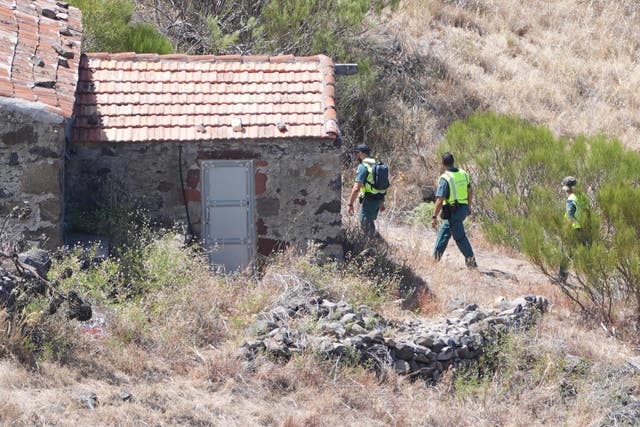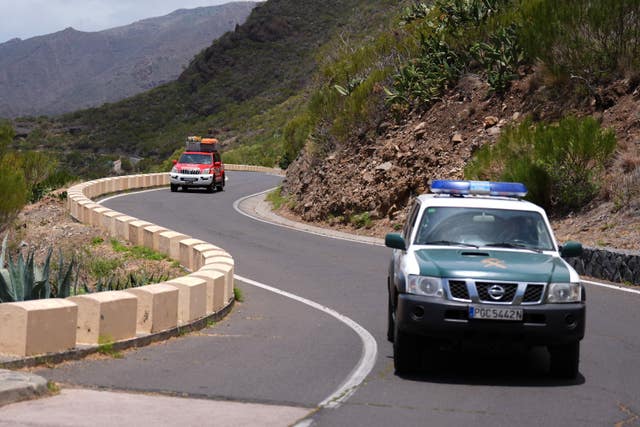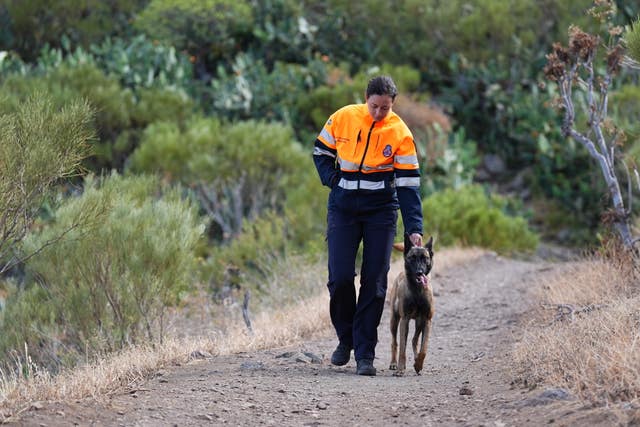Inquest on teenager Jay Slater’s death in Tenerife adjourned after mother’s plea
The 19-year-old from Lancashire vanished on the holiday island last summer.

An inquest into the death of Jay Slater in Tenerife last summer has been adjourned after a plea from his tearful mother.
Debbie Duncan said the 19-year-old had gone on holiday and never come home, and told the hearing she still had questions that needed answers.
A number of witnesses have been asked to give evidence at the hearing at Preston Coroner’s Court but have either not been traced or were unable to attend, despite extensive efforts, the court was told.
The witnesses include friends he was with on the night out before his disappearance and two men whose Airbnb holiday let he went to before vanishing.
After all the evidence had been heard on Wednesday, Ms Duncan addressed Dr James Adeley, senior coroner for Lancashire and Blackburn with Darwen.
She said: “How can we ever get any understanding?
“There’s things we want to question. We want these people to be sat in front of us, because our son went on holiday and didn’t come back, so there’s questions we need to ask.”
After a brief break in proceedings Dr Adeley returned to court, agreeing to the adjournment to make a final effort to trace the witnesses.
He said a key question for any inquest is how somebody died and in Mr Slater’s case a simple explanation could be “he has walked into the middle of nowhere and fallen off a cliff”.
He added: “However, you wish to speak to the witnesses who last saw him. I will do what I can to accord with your wishes and provide the answers you want. I’m not confident of success.”
After Ms Duncan and her family thanked the coroner, he added: “I appreciate your need for answers. I will do my best but there are limitations in what I can do.”
The witnesses the court tried to trace included Bradley Geoghegan, who is understood to be on holiday, and Brandon Hodgson and Lucy Law, who were with him in Tenerife but are believed to be out of the UK.

The two men who were staying at the Airbnb property – Ayub Qassim and Steven Roccas – have also not been traced, despite summonses being issued.
Mr Slater, 19, from Oswaldtwistle, Lancashire, was holidaying on the Spanish island and had been to the NRG music festival with friends at the Papagayo nightclub in the resort of Playa de las Americas on June 16 last year.
He is believed to have gone to the Airbnb apartment in the early hours of the next day, then subsequently vanished and was reported missing on June 18.
His body was found in a steep and inaccessible area by a mountain rescue team from the Spanish Civil Guard near the village of Masca on July 15.
Preston Coroner’s Court heard on Wednesday that traces of drugs, including cocaine, ketamine and ecstasy, were found in Mr Slater’s body and pathologists concluded his death from head injuries was consistent with a fall.
Toxicology expert Dr Stephanie Martin told the hearing that analysis of Mr Slater’s body showed traces of MDMA and MDA, commonly known as ecstasy, along with cocaine and alcohol.
Analysis of samples by Spanish authorities also showed the presence of ketamine which was not found in the UK samples.
Home Office pathologist Dr Richard Shepherd detailed Mr Slater’s injuries from his post-mortem examination.
Dr Shepherd said: “The pattern of the injuries were entirely consistent with a heavy fall, a fall from a height, landing on his head.”
Dr Adeley asked the witness if there was any suggestion of an assault or restraint of the teenager.
Dr Shepherd said: “That’s something I considered very carefully, something I would always look to identify.
“The pattern of the injuries when someone is assaulted or restrained is very different from the type of injuries and pattern I found with Jay.”
Dr Adeley continued: “Nothing to suggest that was the case?”
Dr Shepherd said he concluded the cause of death as a head injury.
Detective Chief Inspector Rachel Higson, from Lancashire Constabulary, told the hearing analysis had been carried out on communications on Snapchat and the location of Mr Slater’s phone in the period he disappeared.

She said during the evening out with friends there were messages from them to him advising him to go home as he was “off his head”.
A further message from a friend read: “You need to get home lad you are off your Barnet.”
Mr Slater replied: “You think I’m going home, you must be disabled.”
Later, he sent a short video of him in the back of a moving vehicle.
At 7.08am Mr Slater sent a seven-second video of his surroundings outside the Airbnb let in Masca.
Ms Higson said phone location data suggested Mr Slater left the property at around 7.45am.
At 8.35am, Ms Law sent him a message saying: “Before it gets boiling get back to wherever you have come from,” and at 8.50am there was the last known outgoing communication from Mr Slater’s phone, a 22-second call from him to Ms Law.
Analysis of his phone battery showed he had just 3% power at 8.22am and 1% at 8.52am.
Health data recorded by the phone showed a lot of steps and activity before 8.49am but none after 8.51am, which suggested the phone battery had died.
Ms Higson said Mr Slater made reference in phone messages to being “incapacitated” and there were multiple attempts by friends to get in touch with him.
The officer added: “There is nothing at all that would suggest Jay was frightened, under any threat, scared of anybody or forced to do anything against his will.”
Statements were read from Ramon Hernandez and Juan Diaz, who were working near the holiday let Mr Slater had stayed at.
Both statements said that at around 7.45am on the day Mr Slater disappeared, an “English speaking guy” carrying a half-litre bottle of Coca-Cola approached them and asked what time the local bus arrived.
The man, later identified as Mr Slater, was told a bus was due around 10am but there was no local taxi service.
The men did not see him leave.
Marieke Krans from Dutch rescue charity Signi Zoekhonden, which uses dogs, said the service offered to help Mr Slater’s family with the search and travelled to Tenerife on July 14.

She said that on July 15 the search team went to the top of a ravine close to Mr Slater’s last known phone location and dogs picked up his scent.
She added that the first part of the path was “pretty easy” to walk but it became more difficult.
Searches continued in the following days, she said, and the route became more difficult as the team came closer to where Mr Slater’s body was eventually found.
She said: “It’s really steep, really dangerous. There is more difference in heights, you have to climb up and down to get further. It’s really steep and rocky and the last part you need ropes to get up or down. It’s that steep.”
She said it was “easy” to lose your footing.
Ms Krans said the searchers tracked Mr Slater’s scent all the way to where he was found and there was “no evidence” he had been travelling with anyone else.
She added that by 10.30am or 11am the temperature had risen quickly.
“The temperature is the most dangerous (thing) because it increases pretty fast,” she said.
She said it would take three to three and a half hours to walk to the location from the holiday home where he had been seen earlier that day.
Ms Krans added: “The last hour was difficult to walk but you can get there and we did see some stream of water, so maybe he has drunk some water.”
She told the coroner it would be “impossible” to carry someone over that terrain.
“He must have walked there himself because you can’t carry somebody down there,” Ms Krans said.
A date for the resumption of the hearing has not been set.





